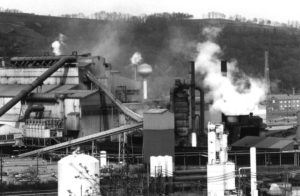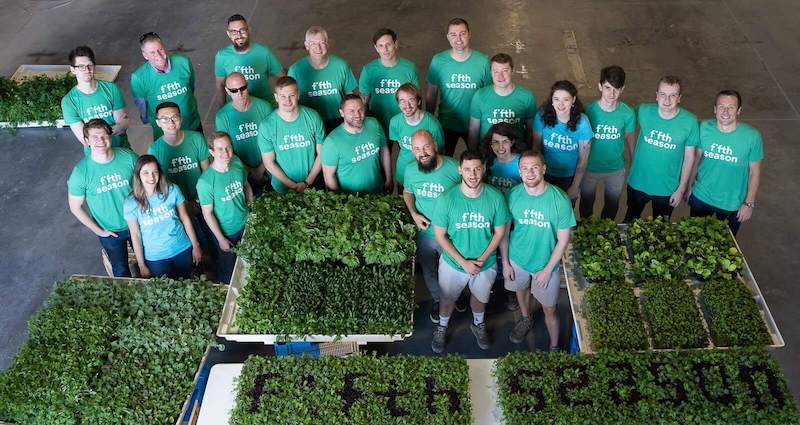The historic steel town of Braddock, Pennsylvania has become somewhat of a national icon of a desperate, post-industrial community that’s valiantly trying to revitalize.
Braddock’s median household income is just $22,609, and its population has shrunk from 18,000 after World War II to only 2000.

Ovens and mill building of the Edgar Thomson steel mill, as of the mid-1990s.
Photo by David Rochberg via Wikipedia.
But now, a new innovation in more-sustainable, indoor urban farming is taking root on a vacant lot in the shadow of the active Edgar Thomson Steel Works. At the height of the U.S. steel economy, Edgar had some 20,000 employees.
A company called Fifth Season is about to build a 60,000 square-foot, highly-efficient, commercial-scale indoor vertical farm that uses robotics and machine learning to farm. If successful, they plan to replicate it nationally.
Fifth Season, which incubated its first urban farm at Carnegie Mellon University (a national leader in robotics research and development), will use proprietary robotics technology at its Braddock location to grow fresh produce at a fraction of the cost of traditional agriculture for Pittsburgh-area grocery stores and restaurants.
The indoor space will provide the ideal growing environment to deliver produce in any season and is projected to produce over 500,000 pounds of lettuce, spinach, kale, arugula and herbs during the first full year of operation. The facility, which plans to open in early 2020, will be partially solar-powered and will require 95 percent less water compared to traditional growing operations due to a proprietary water filtration and recycling system.
Austin Webb, Fifth Season’s co-founder and CEO, said the company’s Braddock farm will set a new vertical agriculture standard for efficient, safe and sustainable production of pesticide-free leafy greens and herbs in urban communities.
“We have developed fully integrated, proprietary technology to completely control the hydroponic growing process and optimize key factors such as energy, labor usage and crop output,” Webb added. “The result is a vertical farm design that has over twice the efficiency and grow capacity of traditional vertical farms. Our unprecedented low costs set a new standard for the future of the industry.”
Fifth Season, originally founded as RoBotany Ltd., is a consumer-focused technology company that was incubated at Carnegie Mellon University’s (CMU) Swartz Center for Entrepreneurship, an alliance of CMU’s business, robotics and other schools focused on fostering innovation.
The company has raised over $35 million to date led by Drive Capital and other private investors with close ties to CMU. Its leadership team has deep expertise in plant science, robotics, AI and systems engineering.
Fifth Season developed and perfected its technology with two R&D vertical farms in Pittsburgh’s South Side neighborhood. Their leafy greens have been sold at local retailers, such as Giant Eagle and Whole Foods Market, along with popular Pittsburgh restaurants Superior Motors, honeygrow and Kahuna. Produce from the flagship production farm coming to Braddock will also be available in Pittsburgh-area grocery stores and restaurants.
“The goal through our first three years of development was to prove we could bring fresh food to urban customers at prices competitive with conventionally grown produce,” Webb said.
“We have developed fully integrated, proprietary technology to completely control the hydroponic growing process and optimize key factors such as energy, labor usage and crop output,” Webb added. “The result is a vertical farm design that has over twice the efficiency and grow capacity of traditional vertical farms. Our unprecedented low costs set a new standard for the future of the industry.”
Webb said the Braddock farm’s ideal growing environment will deliver perfect, pure produce, in any season. It will produce over 500,000 pounds of lettuce, spinach, kale, arugula and herbs from its 25,000-square-foot grow room during the first full year of operation. The facility is partially solar-powered and requires 95 percent less water compared to traditional growing operations.
Webb concluded by saying that the company is planning a staged expansion in similar-sized in cities across the U.S.
Unless otherwise credited, all photos are courtesy of Fifth Season.


